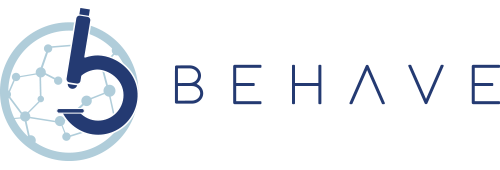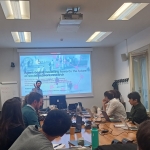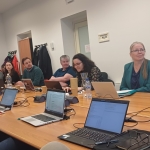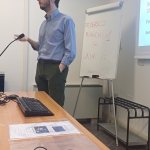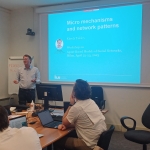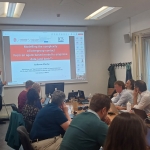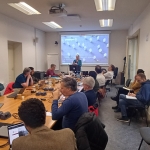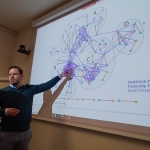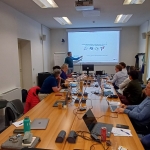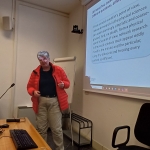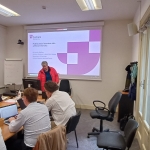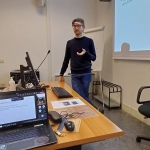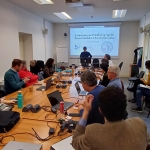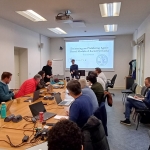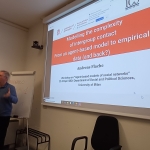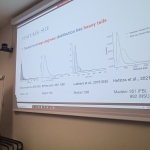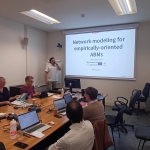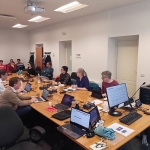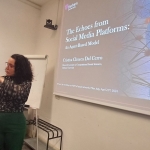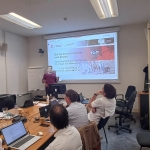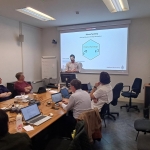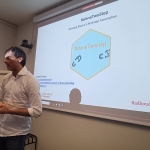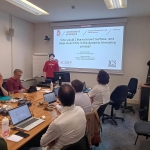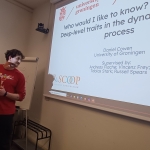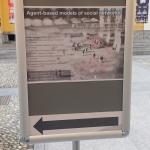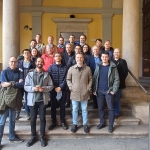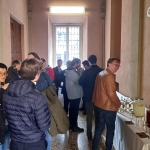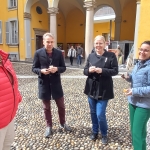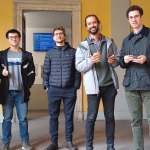Hybrid workshop on “Agent-based models of social networks”, Department of Social & Political Sciences, Seminar room, Via Conservatorio 7, 20122 Milan, 22-23 April 2024
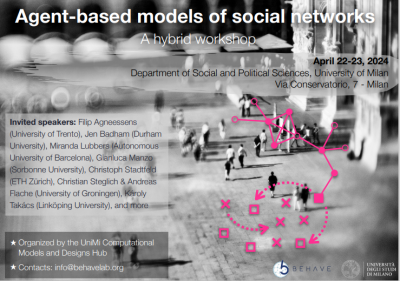 Organised by the Computational Models and Designs Hub, and funded by the Department of Social & Political Science of the University of Milan under the “Departments of Excellence” MIUR grant.
Organised by the Computational Models and Designs Hub, and funded by the Department of Social & Political Science of the University of Milan under the “Departments of Excellence” MIUR grant.
This workshop aims to provide a venue to discuss the current and future role of agent-based modelling (ABM) in social network research among a carefully selected group of scholars who have explored such applications in recent years. ABM is now a well-established method in various social scientific fields, where it has been fruitfully applied as a tool for the enhancement of theory-building processes, the empirical test of causal mechanisms and the exploration of counterfactual scenarios. Because of its high flexibility, ABM allows researchers to dynamically account for tie selection and network influence on behaviour as the outcome of nodes undertaking a large, heterogeneous variety of possible decision-making processes. In this way, network models can be conveniently adapted to specific social contexts and different types of relationships, allowing for different modelling strategies in terms of dynamic scheduling, agents’ cognitive heuristics and available information, heterogeneity. However, the full potential of ABM is still under-employed in social network research, although recent computational advances have widened the integration possibilities of ABM with empirical data, thereby allowing for more precise parameter estimation and model calibration, which now enables a departure from the more traditional integration of theoretical ABMs with abstract network topologies. This approach expands the horizons of ABM beyond theoretical realms, offering a powerful means to explain network dynamics and other macro-level outcomes through micro-level mechanisms. This workshop brings together a carefully selected group of scholars at different career stages, identified as pursuing important projects through ABM in social network research. The workshop seeks to discuss advantages and limits of different applications, while fostering stronger ties to shape the trajectory of the field for the foreseeable future.
Programme
Monday, 22 April 2024
9:00 Welcome (Flaminio Squazzoni, University of Milan)
9:30 Federico Bianchi (University of Milan), Agent-based modelling for social network research
10:00 Károly Takács (Linköping University / Hungarian Academy of Sciences), Micro mechanisms and network patterns
10:30 Andreas Flache (University of Groningen), Modelling the complexity of intergroup contact. From an agent-based model to empirical data (and back?)
11:00 Coffee break
11:30 Francesco Renzini (University of Milan), Estimating and validating agent-based models of social networks
12:00 Jen Badham (Durham University), Putting social structure into artificial networks
12:30 Christoph Stadtfeld (ETH Zurich). Linking behavioral micro models and macro features in empirical studies on multilevel networks
13:00 Lunch (courtyard)
14:00 Miranda Lubbers (Autonomous University of Barcelona), Agent-based modeling of societal networks
14:30 Michail Bojanowski (Autonomous University of Barcelona), Network modeling for empirically-oriented ABMs
15:00 Cristina Chueca del Cerro (Durham University), The echoes from social media platforms: an agent-based model of echo chambers’ emergence
15:30 Coffee break
16:00 Christian Steglich (University of Groningen / Linköping University), Halting network cascades with ERGMs
16:30 Jochem Tolsma (University of Groningen), A small step from ministep to twostep: analysing the co-evolution of network structures and behaviour by relaxing the ministep assumption from ‘RSiena’ with ‘RsienaTwoStep’
17:00 Daniel Cowen (University of Groningen), Who would I like to know? Surface- and deep-level traits in the dynamic friendship process
17:30 – 18:00 Discussion
Tuesday, 23 April 2024
9:00 Yunsub Lee (Autonomous University of Barcelona), An agent-based modeling approach to measuring centrality: how to identify the influential nodes within context-specific network flows
9:30 Tibor Zingora (University of Groningen), The identification of influential adolescents in schools using empirically-anchored simulations
10:00 Alla Loseva (University of Groningen), Simulating downward spirals of outgroup dislike in empirical school networks
10:30 Tanzhe Tang (University of Groningen), Investigating opinion dynamics mechanisms using Stochastic Actor-Oriented Model
11:00 Coffee break
11:30 – 13:00 Closing discussion
